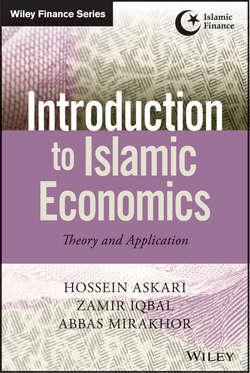Читать книгу Introduction to Islamic Economics - Mirakhor Abbas - Страница 18
На сайте Литреса книга снята с продажи.
Chapter 2
Foundation of the Islamic Economic Paradigm
Significance of Rule Compliance
ОглавлениеA verse in the Quran contains the necessary and sufficient condition for the existence of an ideal society and economy: “If the members of the collectivity were to be rule-compliant and ever-conscious surely We should have opened for them blessings from the sky and from the earth. But they rejected [the Divine messages] therefore we seized them on account of their [noncompliant] deeds” (Quran 7:96). The necessary condition for an ideal economy is being rule compliant. The sufficient condition of taqwa (i.e., the inner torch of consciousness of the ever-presence of the Creator) requires that there be no occasional lapse in rule compliance whatsoever. That is the ideal society and the economy is one in which humans, individually and collectively, are fully rule compliant. In such a society, the members and their collectivity comply with rules specified for all in the society and other rules relating to behavior in particular circumstances, such as those relating to economic behavior. The first include, inter alia, the rules of enjoining the good and forbidding evil behavior; of consultation, cooperation, and avoiding harm to others; and of establishing social justice. Of these, by far, the first is the most crucial. It is an imperative without which compliance with all other rules, general and specific, will be weak or avoided altogether without impunity. It is a foundational rule that empowers all other decreed rules of behavior compliance that allow humans to tread the absolutely desirable path of closeness to Allah (swt) commanding us and others to rule compliance that derives directly from cognizance and acknowledgment of the love bond (walayahh) between the Creator and humankind as well as its derivative love bond among humans.
When we say that Islam is a rules-based system, we mean that the rules are prescribed by the Lawgiver, who monitors compliance, and there are rewards for compliance and sanctions for noncompliance. Accordingly, the prescriptions ordained by the Lawgiver and explained and implemented by His Messenger are rules. The most crucial and central to Islam's concept of development is the progress humans make in developing the self. Without this, balanced and appropriate progress in the other two dimensions of development is not possible; any forward movement in them without self-development leads to harmful distortions. Compliance with the rules prescribed by the Lawgiver prevents distortions. The rules constitute a network that regulates all dimensions of the human experience, individually and collectively, on this plane of existence.
The rules in Islam go beyond those considered important by economists for economic growth – property rights protection, the enforcement of contracts, and good governance. In Islam, these are the rules of seeking knowledge through education; avoiding waste, harm, or injury; pursuing hard work; and not engaging in fraud, cheating, or abuse of property. The internalization of the rules of conduct governing market participation and compliance with them ensures that the market will be an efficient mechanism to create a balance within an economy. Because fairness and justice are ensured by rule compliance, the price that emerges will be a fair price. Rules regarding the fair treatment of others ensure that those who participate in the act of production receive just payment for their efforts. Thus, market-based distribution guided by the price mechanism would also be fair. Rules governing income redistribution ensure that the rights of others to access resources are preserved before income becomes disposable. All economic transactions are governed by rules requiring strict faithfulness to the terms and conditions of contracts and promises. Hence, the probability of asymmetric information and moral hazard, and their negative consequences, is minimized. Rules governing consumption ensure that there is no opulent or wasteful consumption. Since consumers internalize these rules before entering the market, the rules also shape consumer preferences and thus demand, moderating excessive wants. Rules governing the use of disposable income and wealth (i.e., income and wealth after they have been cleansed of the rights of others) ensure that wealth is not hoarded and that it is made available in the form of investment and expenditures in the way of Allah (swt). Prohibition of interest ensures the direct participation of wealth holders in sharing risk associated with investment.
The internalization of rules of behavior by individuals and their institutionalization, along with the incentive structure and enforcement mechanism, reduces uncertainty and ambiguity in decision-action choices confronting the individual and the society. The problems associated with coordination are resolved through compliance with the rule of cooperation. Moreover, a binding rule from the archetype model resolves the negative aspects of the collective action problem. Not only cooperation is ordained as a rule-based feature of society's institutional structure; the rule of negation of harmful externalities and reciprocation of one harmful act by another (i.e., the rule of not harming third parties by one's action and the right not to be harmed by anyone's action without reciprocation) mitigates the risk of the emergence of collective action problems.25
25
Kamali (2006), and Mirakhor and Hamid (2009).
